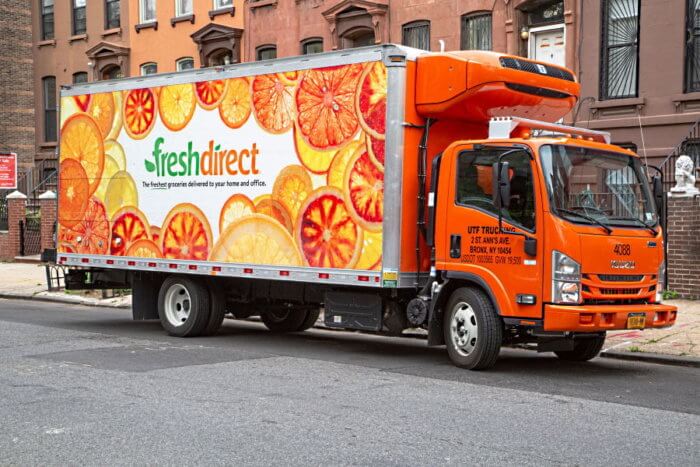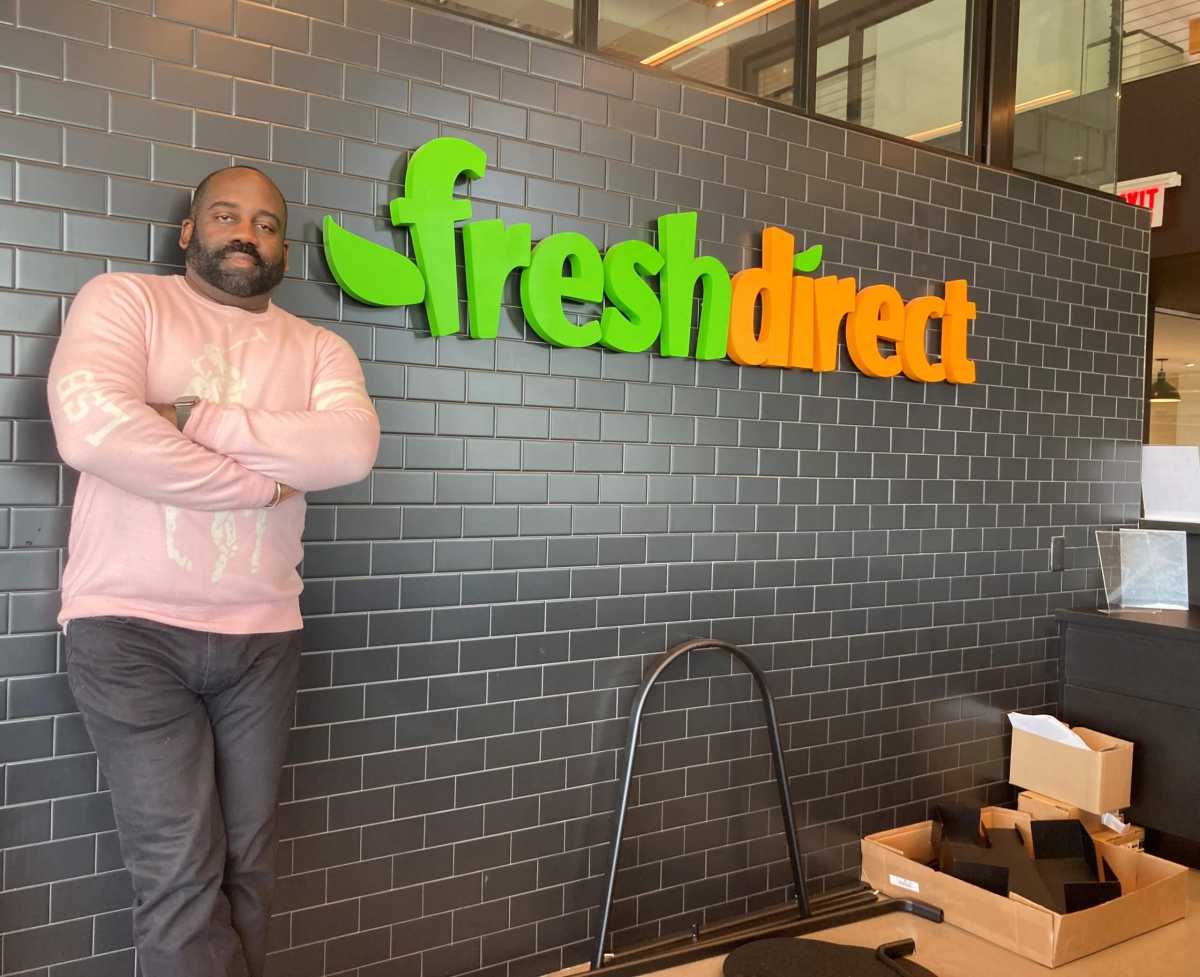When FreshDirect finalized its relocation from Long Island City to the South Bronx in 2018 — erecting a state-of-the-art facility in Port Morris with shadows of One World Trade Center and Manhattan’s iconic skyline in the background — the move was initially met by vocal opposition from local community groups and environmentalists. In response, the online grocery delivery service honored a job creation pledge to the city by adding 1,500 Bronx workers to its workforce.
And since the COVID-19 pandemic, FreshDirect has seen its impact in the city materialize into expansion opportunities beyond NYC’s borders as supermarket inflation prices drive patrons away from their aisles and food insecurity becomes a rising trend.
In the words of FreshDirect’s Vice President of Public Affairs Larry Scott Blackmon Jr., FreshDirect’s distribution, as its name suggests, relies on a process that involves partnerships with local producers and immediate distribution to customers.
“We’re not a supermarket where your food comes in and it sits … and goes from the farm to the distributor where it sits in the back, then it goes to the distributor to the local supermarket where it sits until you pick it,” said Blackmon Jr. “With FreshDirect, that (food) comes from the producer straight to us, thanks to great relationships with our partners, and then straight to you so you’re tasting it while it’s fresh.”
Overall grocery prices soared 6.5% in 2021, marking the biggest increase in 13 years and it’s just another uptick in prices caused by record-high inflation in the U.S. Compounded by a 1 in 4 food insecurity rate in the Bronx, lack of fresh food access is exacerbating issues in the borough. It’s also an issue for underserved areas throughout New York state where food scarcity has declined, and disparities in food access are wider than ever.
Data obtained by the Bronx Times from the state shows stark racial ethnic disparities in access to food, with 29% of Latino and 20% of Black adults reporting household food scarcity, compared with 8% of Asian-American and 5% of white households. Closing those food gaps could lead FreshDirect to widen their availability throughout the city and state.
“Growth for Fresh Direct means deeper penetration in the New York market,” said Blackmon, who estimated FreshDirect delivers 100,000 grocery boxes each week. “People look at us like this type of Google-sized company, but we’re really a large small business and there’s so much more room for a FreshDirect in the New York market and surrounding areas like New Jersey, upstate New York.”
While New York City is a main focus for the company, FreshDirect also has a footprint in Philadelphia, Connecticut, New Jersey and Washington, D.C.
When Dutch company Ahold Delhaize acquired FreshDirect in January 2021, the acquisition gave the Dutch retailing giant (2020 revenue hit 75 billion euros) a foothold in the the U.S. online grocery market, which generated $8.7 billion in sales during February.

Instacart is still the king of that market, commanding 45% of online grocery sales in New York compared to 21% for FreshDirect, according to a report by Earnest Research from last year. When it comes to preference in the online grocery market, patrons prioritize low or no delivery fee ahead of price of items, in-stock availability, product quality, product assortment and delivery speed in that order, according to retail research firm Coresight.
To compete with other online food grocery giants such as Amazon and the aforementioned Instacart, FreshDirect’s growth strategy under the leadership of one-time interim CEO Farhan Siddiqi, included the lowering of prices and doubling down on the New York market through small, automated warehouses in the region to speed deliveries of wine and other popular items.
Ahold Delhaize’s online sales increased 114.7% in the third quarter of 2020, which the company attributes “largely to the COVID-19 outbreak,” that saw the mass appeal and necessity of online or app-based food delivery from grocery to dining services.
And the retailer also boosted its product assortment by 25% over that time frame.
FreshDirect, however, is still battling an undercurrent of dissension from local environmental groups, who cite their presence in Port Morris as a reason for heightened levels of auto traffic on the highways near the warehouse in Port Morris — just north of the Harlem River Yards — which also includes a pair of mixed-use residential units that border the river yard.
According to environmental justice group South Bronx Unite, a traffic analysis of roads in the area bounded by East 138th Street, Lincoln Avenue, Walnut Avenue and the Harlem River Yards — home to roughly 17,200 people — showed traffic congestion and “traffic-related sleep disturbances have increased since the Port Morris warehouse opened in 2018.”
FreshDirect officials said they are working evergreen with city partners, including local environmental groups, and those efforts include sustainable shifts in both their environmental practices and workplace wellness. FreshDirect has also built partnerships throughout the borough and citywide with food source organizations and local food banks.
“We’ve delivered on all our promises and the community and neighborhood has embraced us as a result,” Blackmon Jr. said.
The 40,000-square foot facility includes an environmentally friendly and energy-efficient campus equipped with robotic pick towers, smart routing technologies and nine miles of conveyor belts. The atmosphere inside the FreshDirect warehouse includes sanitation efforts, various wellness and private spaces for employees to take a break or commune, and Blackmon Jr. says that workers are “a part of a family.”
Internally, FreshDirect employees joined the New York City’s sweeping labor movement becoming the latest NYC employee workforce to unionize, as employees ratified a collective bargaining agreement with the United Food and Commercial Workers (UFCW) last week. Approximately 1,800 Fresh Direct employees will be represented by UFCW Local 342.
FreshDirect employees had tried once before to unionize in the late 2000s, but those attempts failed.
“[UFCW 342] President Deana Abondolo and the Local 342 organizing department have been involved in this ongoing campaign for over 15 years,” the union said in a statement. “We are proud to say that on Thursday, April 14, 2022, the members of FreshDirect overwhelmingly ratified their contract. Welcome FreshDirect members.”
A few FreshDirect employees told the Bronx Times that while they feel FreshDirect is a great employer — particularly thanks to a low buy-back option for workers for unfulfilled orders — but that unionization and the company’s support of those efforts is a pathway to continued morale in the company.
Reach Robbie Sequeira at rsequeira@schnepsmedia.com or (718) 260-4599. For more coverage, follow us on Twitter, Facebook and Instagram @bronxtimes

























